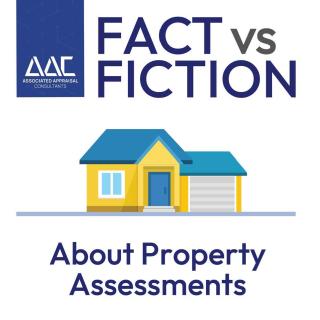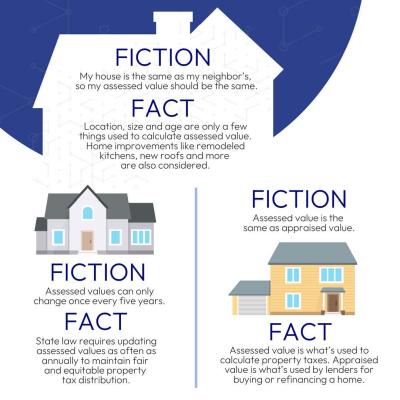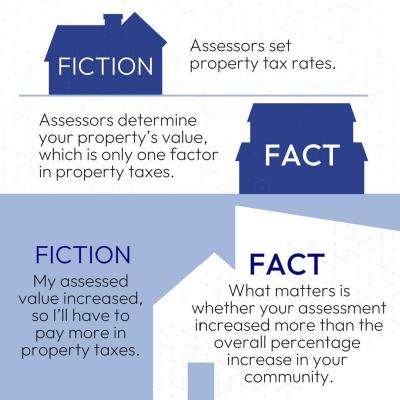Revaluation 2024

Associated Appraisal Consultants, Inc. has been retained by the Village of Mukwonago to complete a revaluation of all taxable property for the 2024 assessment year. The revaluation will establish new assessed values in an equitable fashion for all properties in the municipality as of January 1, 2024.
To make an accurate assessment, it is necessary for Associated Appraisal to conduct an exterior view of all residences, apartments, and businesses in the Village. It will not be necessary to review the interior of any buildings unless there is new construction or a building permit has been taken out for a remodel of the interior of your property. If any of these changes have occurred since your last interior inspection, this notice is an official request to view the interior of your residence so we can properly assess your property. If these facts exist, making an interior view necessary, please contact us if you are refusing to allow the interior inspection.
The assessors will begin working in your neighborhood within the next several weeks. All staff members from Associated Appraisal will carry a letter of introduction from the Village of Mukwonago, a photo ID and drive a marked fleet vehicle displaying the Associated Appraisal company name. If no one is home when visiting a property, a door hanger will be placed on the main entrance to let you know we were on your property. No further action is needed after this tag is hung unless you have interior changes. If you own rental property in the Village, please inform your tenants that we will be visiting that property soon, so we can have their full cooperation for this review.
Notices of Assessment will be mailed when the property reviews are complete, and an assessment is determined for each property. Property owners will have an opportunity to discuss the assessed values with an Associated Appraisal representative at the Open Book session. After the Open Book session, property owners can appeal an assessment to the Board of Review. The Notice of Assessment will contain the Open Book and Board of Review dates. Property assessment and appeal information is available at: http://www.revenue.wi.gov/pubs/slf/pb060.pdf.
Associated Appraisal and the Village of Mukwonago appreciate your cooperation. We have included property owner rights and a list of common assessment questions on the back side of this notice for your review. Should you have any additional questions, please call (920) 749-1995 to speak with one of our knowledgeable assessors.
Thank you for your help in creating a successful 2024 Revaluation Program.
Frequently Asked Questions
What is a revaluation?
Why is the revaluation necessary?
Municipalities are required by State Statues to maintain property assessments within 10% of fair market value at least once in a 5-year period.
Will my property values change?
Most likely yes. Some neighborhoods and property types may have increased in value and others may have remained the same. One purpose of a revaluation is to make sure that the assessed values reflect the changes that have occurred in property values.
How does the assessor value property?
How can my assessment change when I haven’t done anything to my property?
As property values change in the marketplace, those changes must be reflected on the assessment roll. Economic conditions such as recent home sales in your neighborhood, sales of reasonable comparable buildings, and inflation will influence the value of your real estate.

What if I don’t agree with my assessment?
You can schedule a meeting with the assessor for Open Book. During this informal session, the assessor will explain how your assessment was prepared, view the property record for your property, what factors were considered in determining a value for your property and view comparable house values. NOTE: When you receive your December tax bill, it is too late for the assessor to review the assessment.
Do all assessments change at the same rate?
What if, after this informal meeting, I still disagree with the assessment?
You can arrange to appear before the Board of Review. To do so, you will be required to complete an objection form, which must be completed in full. You will then be scheduled for a hearing where you will present your case regarding the assessed value of your property.
What evidence do I need to present to the Board of Review?
The best evidence of value is the recent sales price of your property. The next best evidence is the arm’s-length sales of reasonably comparable properties. These are properties similar to yours in location, age, style, condition, and other features that affect market value, such as the number of bathrooms, bedrooms and size of garage.
I’ve been told that everybody’s taxes go up after a revaluation. Is this true?
No. A reassessment has no impact on the total amount of taxes collected. If the total levy remains the same, only those properties, which are not presently paying their fair share will pay more taxes after the revaluation. Properties presently paying more than their fair share will pay less.
How will my taxes change as a result of a new assessment?
Though the value of your property affects your share of taxes, the actual amount you pay is determined by the budget needs of the schools, village, county, technical college and state. All of these taxing units decide what services they will provide in the coming year and how much money they will need to provide those services.
How is property data kept current after a revaluation?
Assessments can only be as accurate as the data on which they are based. It is not possible to arrive at equitable assessments using inaccurate and incomplete data. Therefore, maintaining property records is essential to maintaining assessments. Because property characteristics are continually changing, record cards must be updated on an annual basis to account for new construction, remodeling, land splits, and demolitions. If the record cards are not properly maintained, they will no longer aid the assessor in making defensible assessments, and the benefits of the revaluation will soon be lost.
To help maintain property records, the assessor is furnished with data from all real estate transfer returns. Real estate transfer returns are confidential documents. Market data from the transfer returns should be analyzed and posted on the property record cards. The assessor should also be notified of all building permits, which alert the assessor to changes in property characteristics. In addition, it will be necessary for the assessor to periodically inspect all properties and update the property record cards to reflect current conditions.
Glossary of Terms
Assessed Value: An estimate of value assigned to taxable property by the assessor for purposes of taxation.
Assessment Ratio: The assessment ratio is the ratio of assessed value to market value. The assessment ratio is determined by Wisconsin State Department of Revenue on an annual basis. If your home is assessed at $200,000, and the assessment ratio for a given year is 90%, then the estimated fair market value of your property would be roughly $222,200.
Market Value: The amount a typical, well-informed purchaser would be willing to pay for a property. The property must be exposed on the market for a reasonable length of time, the payment must be in cash or its equivalent, the parties may not be related, and the financing must be typical for that type of property.
Tax Base: The total assessed value of all assessments in the Village of Mukwonago.
Tax Levy: The total amount of property tax money that a taxing unit (such as the schools, village, county, etc.) needs to raise to provide services.
Tax Rate (Mill Rate): The tax levy divided by the tax base. It is often expressed in terms of dollars per thousand. The tax rate is multiplied by the assessed value to determine the amount of tax that each property must pay.
| Attachment | Size |
|---|---|
| 793.09 KB | |
| 79.97 KB | |
| 272.69 KB | |
| 3.83 MB | |
| 241.95 KB | |
| 72.28 KB |
